Reforma histórica en Chile: empresas revelan a sus dueños reales para contratar con el estado

Tras una importante reforma legislativa aprobada en diciembre de 2023, todas las empresas privadas que participan en el mercado de contratación pública de Chile deben declarar a sus beneficiarios reales.
ChileCompra, la agencia de contratación pública del país, vincula los datos de propiedad beneficiaria con la plataforma de contratación electrónica Mercado Público para detectar posibles vínculos entre funcionarios del sector público y proveedores del Estado. Esta supervisión basada en datos, combinada con intensas campañas de sensibilización dirigidas a compradores y empresas, ha arrojado resultados tempranos muy prometedores.
Según un análisis del Observatorio de ChileCompra, la unidad de monitoreo de la agencia, los conflictos de interés en las compras públicas se redujeron en un 67%. El promedio de casos por mes pasó de 18.7, en el año anterior a la reforma, a 6.1 en el período de 18 meses posterior a la entrada en vigor de la ley. Esta disminución es especialmente significativa si se considera que la nueva ley amplió la definición de conflicto de interés para incluir a todos los funcionarios públicos y a sus familiares, aumentando la probabilidad de detección.
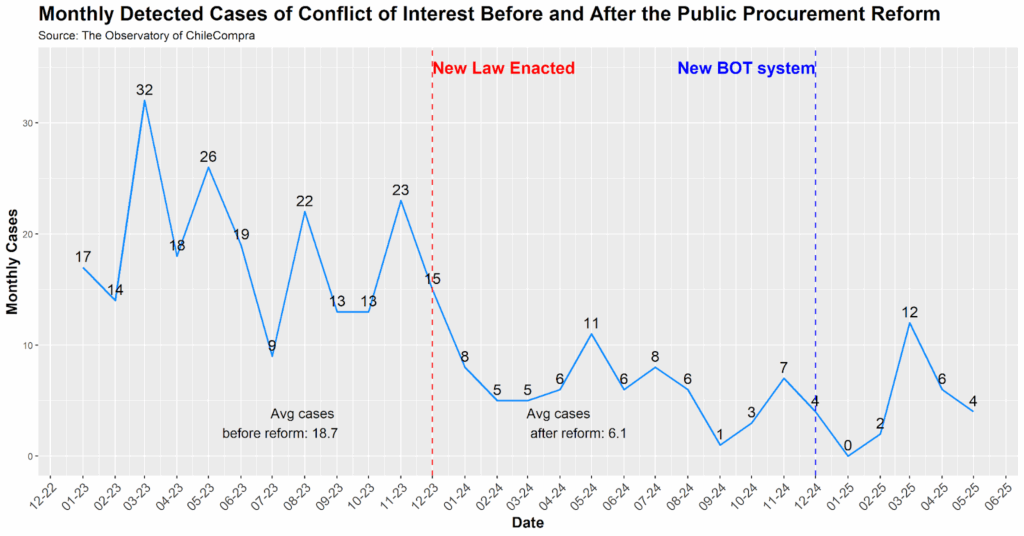
Verónica Valle, directora de ChileCompra, atribuye la rápida adopción de las nuevas medidas al hecho de que se vincularon a incentivos comerciales en lugar de depender únicamente de sanciones legales para el cumplimiento. Cualquier empresa puede registrarse en ChileCompra para mantenerse informada sobre futuras oportunidades de compra, pero solo aquellas que han presentado sus datos de propiedad beneficiaria pueden postularse o ganar contratos.
Como resultado, ChileCompra dispone ahora de datos de más de 185,000 beneficiarios. Además, cada proveedor que participó en una licitación entre enero y septiembre de 2025, reveló su información de propiedad, lo que representa más de 1 millón de procedimientos de adquisición por un valor de 13 mil millones de dólares.
Las amplias campañas de capacitación y comunicación (como “Alto a la Corrupción” y “Combinación Perfecta”) que prepararon a las partes interesadas para la transformación también contribuyeron al éxito de la reforma, afirma Valle.
“Para los proveedores, hicimos hincapié en que la transparencia crearía un mercado más justo y confiable donde las empresas honestas pudieran competir en igualdad de condiciones”, explica Valle.
Para los compradores se enfatizó en que la reforma reduciría su exposición al riesgo al proporcionar información confiable y actualizada sobre quiénes son los verdaderos dueños de las empresas con las que negocian. Esto les permite tomar decisiones de compra más seguras, evitar riesgos para su reputación y cumplir con mayor facilidad las normas de integridad. En resumen, la iniciativa protegería no solo el sistema, sino también a los funcionarios públicos involucrados en las compras, brindándoles mayor certeza y confianza en su trabajo.
Destacamos que la transparencia crearía un mercado más justo y confiable donde las empresas honestas podrían competir en igualdad de condiciones.
Las medidas para reducir el conflicto de interés forman parte de un esfuerzo más amplio de modernización del sistema de compras públicas de Chile, institucionalizado en la enmienda a la ley que entró en vigor en diciembre de 2023. Los objetivos de la reforma incluyen: ampliar la cobertura del sistema electrónico, frenar la corrupción y la colusión, mejorar la competencia y aumentar la participación de las pequeñas y medianas empresas (pymes).
ChileCompra, la Contraloría General de la República y la Fiscalía Nacional Económica tienen acceso completo a los datos de propiedad beneficiaria del registro de proveedores y los están utilizando para una amplia gama de propósitos institucionales, como investigar delitos económicos y prácticas de licitación no competitivas.
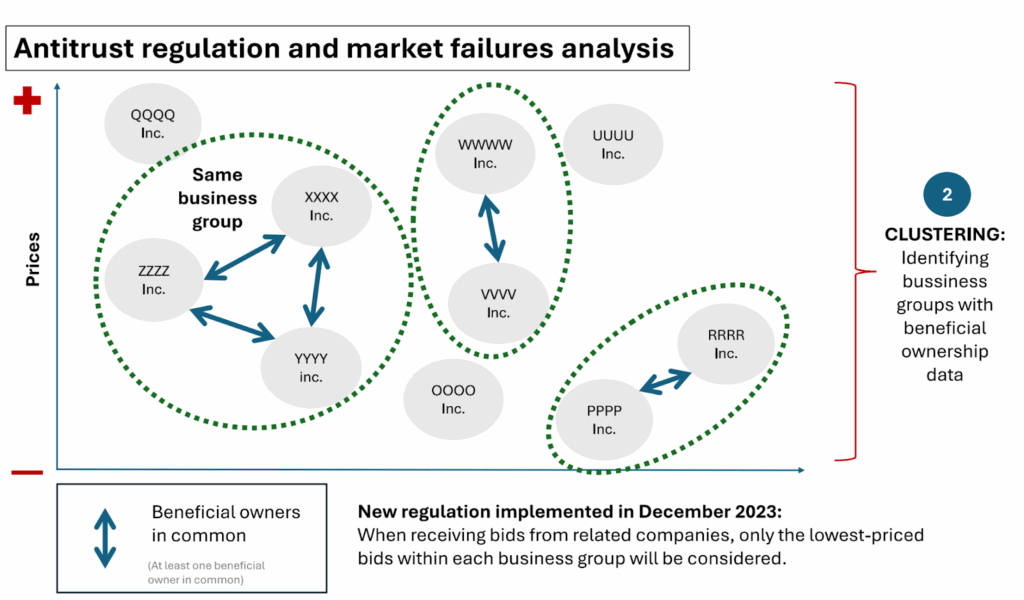
El público puede acceder a los datos desde una plataforma de proveedores fácil de usar, con funciones de búsqueda, perfiles de proveedores, paneles de control y descargas masivas de datos abiertos.
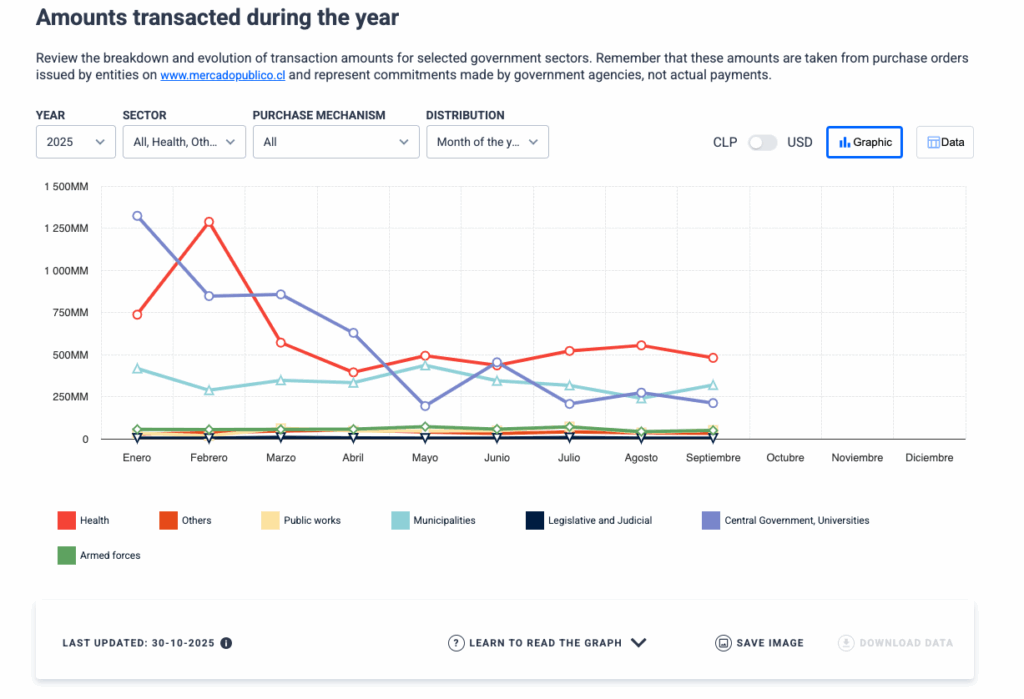
Para los proveedores, el proceso de recopilación de datos también es sencillo. En lugar de ingresar su información manualmente, se pide a las empresas que verifiquen la exactitud de los datos de propiedad beneficiaria que ya tiene la autoridad tributaria. El sistema requiere que los proveedores confirmen esta información antes de ser elegibles para presentar una oferta, enviar una cotización o aceptar una orden de compra.
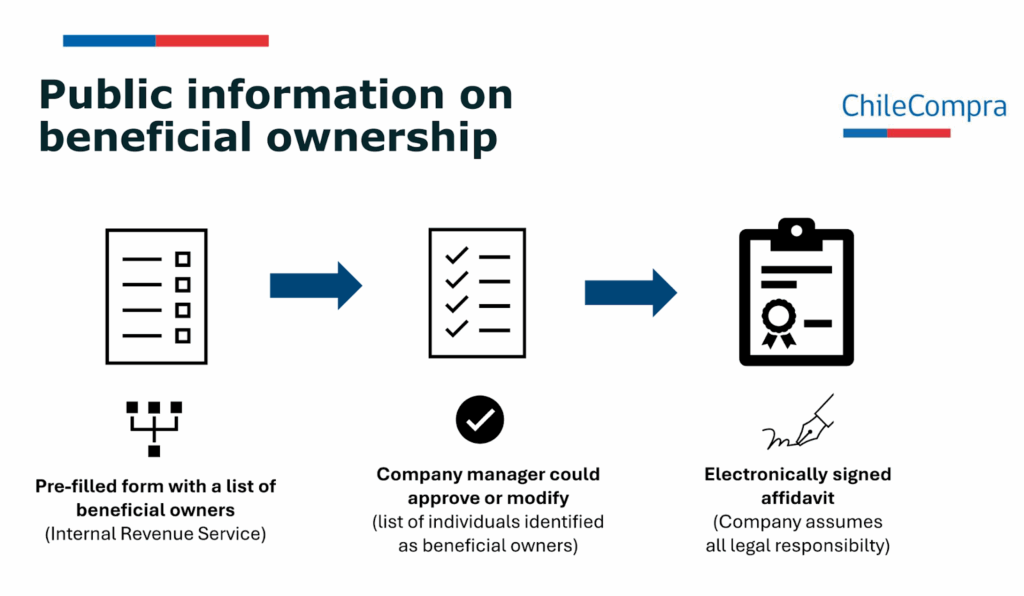
Una importante firma de abogados que representa regularmente a grandes empresas nacionales e internacionales señaló a OCP que ninguno de sus clientes —todos obligados a revelar a sus dueños— encontró que el proceso fuera un obstáculo para hacer negocios. De hecho, las empresas más grandes, con estructuras corporativas más complejas, no reportaron problemas significativos. El bufete señaló que, entre sus principales clientes, que tienen acceso a consultas gratuitas con el equipo legal, ninguno ha utilizado dichas consultas para presentar declaraciones, lo que podría interpretarse como un indicador indirecto de que el proceso ha sido eficaz y sin contratiempos.
La reforma ha enfrentado algunos desafíos. Hubo resistencia por parte de algunos grandes proveedores, incluidos algunos extranjeros, que inicialmente se negaron a proporcionar la información requerida esperando un trato preferencial, pero ChileCompra se mantuvo firme y muchos, aunque no todos, cumplieron rápidamente.
Otra posible limitación es que ChileCompra solo muestra información de propiedad beneficiaria de diversas fuentes (es decir, no administra un registro como tal). La ausencia de una ley que regule un registro nacional y exhaustivo de propiedad beneficiaria podría poner en riesgo estos avances, según un experto internacional en titularidad real.
Detección de Conflictos de Interés
El Observatorio ChileCompra mide los conflictos de interés de la siguiente manera:
- Órdenes de compra emitidas a un proveedor cuyo dueño beneficiario tiene una cuenta de usuario activa con acceso a www.mercadopublico.cl como comprador dentro de la misma entidad contratante.
- Licitaciones en las que uno o más miembros del comité de evaluación son dueños beneficiarios de un proveedor postor.
- Licitaciones donde los responsables del proceso de compra, pago o ejecución del contrato son dueños beneficiarios del proveedor adjudicado.
Cuando se detecta uno de estos conflictos en el sistema del Observatorio, se envía una notificación por correo electrónico al oficial de adquisiciones responsable del procedimiento para que proporcione una justificación o tome las medidas necesarias. Si la entidad no proporciona una respuesta satisfactoria en cinco días hábiles, el caso se asigna a un funcionario del Observatorio para escalarlo a los órganos de supervisión pertinentes, como la Contraloría General, según lo estipula la reforma legal. Todas las irregularidades se informan públicamente en el sitio web y redes sociales del Observatorio.
Otra herramienta poderosa para identificar conflictos de interés ha sido la línea directa de denuncias, una innovación introducida por la reciente reforma de la Ley de Contrataciones Públicas. A través de este canal confidencial, el Observatorio de ChileCompra recibió más de siete mil denuncias entre 2023 y 2025, 114 de las cuales se relacionan con conflictos de interés. Este mecanismo ha contribuido a fortalecer la supervisión y a consolidar una cultura de rendición de cuentas en todo el sistema. El sector con mayor número de denuncias fue el de las universidades y la educación públicas.
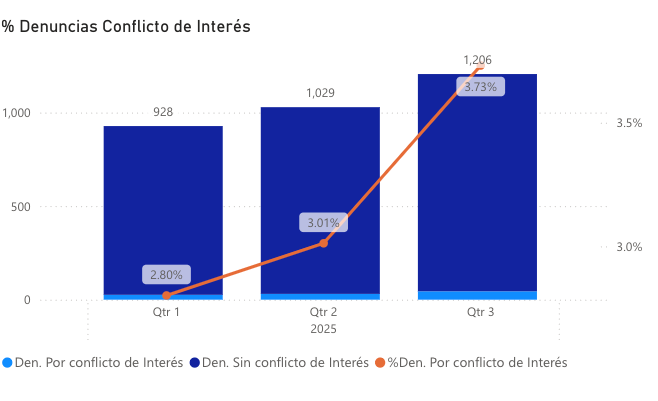
Los compradores ahora también están obligados a reportar todas las comunicaciones y reuniones con proveedores durante la fase previa a la licitación a través del sistema Mercado Público. Un nuevo módulo de Consultas de Mercado está diseñado para recopilar información del sector sobre precios, características técnicas y demás información que ayude a los compradores a preparar adecuadamente una oferta.
Las nuevas disposiciones legales sobre conflictos de interés contemplan los desafíos en zonas pequeñas y remotas donde son frecuentes los vínculos familiares entre funcionarios públicos y proveedores, lo que puede complicar la gestión de dichos conflictos. En tales casos, cuando el comprador lo considere inevitable, se permite la adjudicación con justificación y aprobación de alto nivel.
Disponer de información pública sobre la titularidad real tiene implicaciones que van más allá de las contrataciones públicas, ya que resulta útil para investigar la evasión fiscal, el crimen organizado, la financiación del terrorismo y otros problemas sistémicos. Las contrataciones públicas ofrecen un caso de peso donde los argumentos habituales en contra de la divulgación de datos sobre la titularidad real, como la privacidad, pierden relevancia.
Para otros gobiernos que buscan un punto de partida práctico para mejorar la transparencia de la titularidad real, la experiencia de Chile sirve de ejemplo de cómo los incentivos empresariales que atraen a las empresas al sistema de contratación pública pueden aprovecharse eficazmente para mejorar la integridad y la supervisión, incluso en mercados grandes e internacionales, de una manera relativamente sencilla de implementar.
Para más información, consulte este estudio de caso sobre la reforma chilena en materia de transparencia de la titularidad real en la contratación pública, elaborado por OCP y Open Ownership.